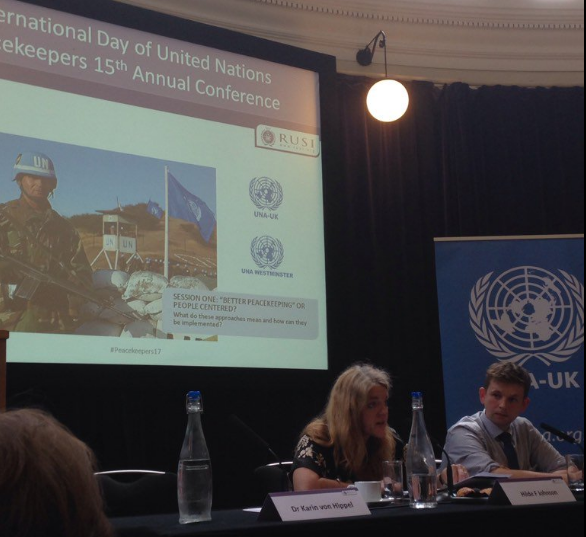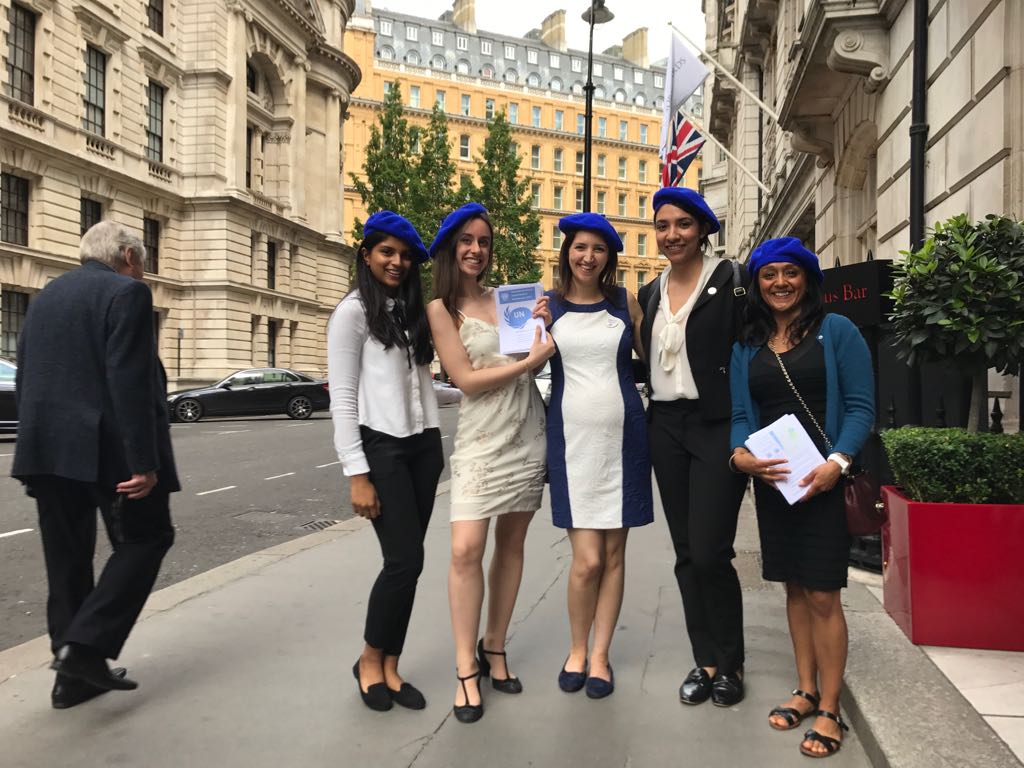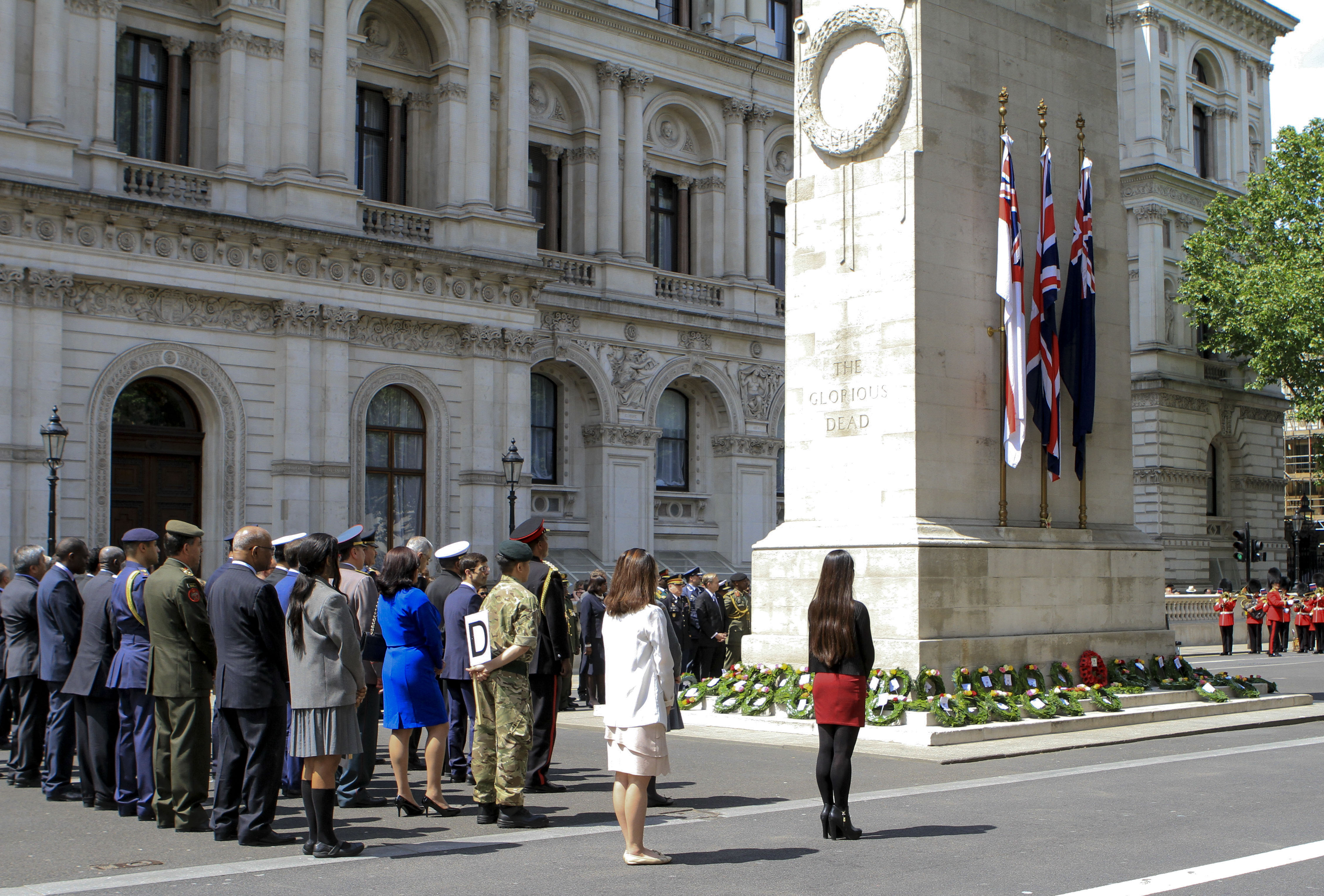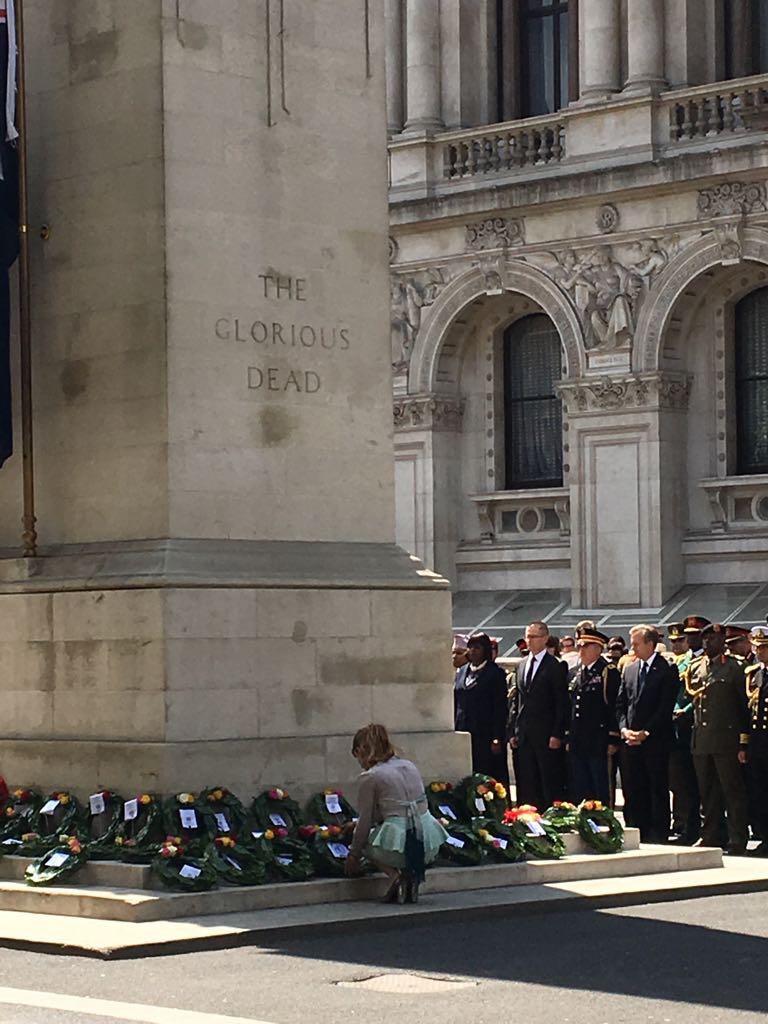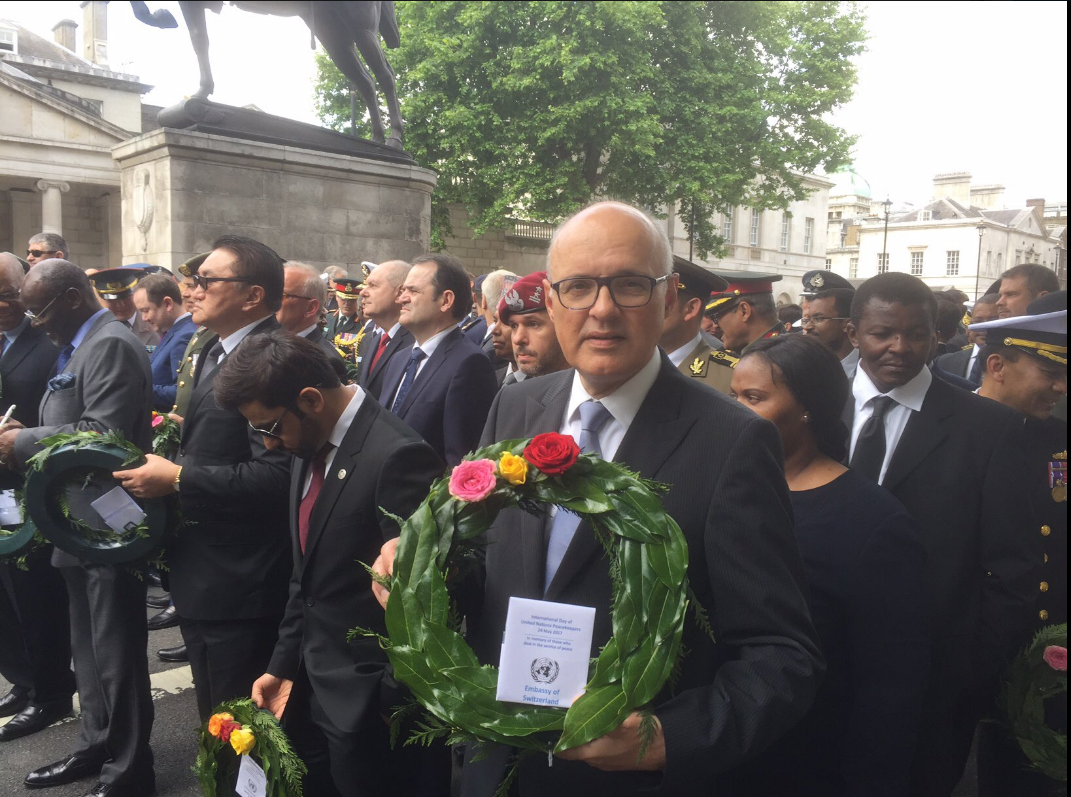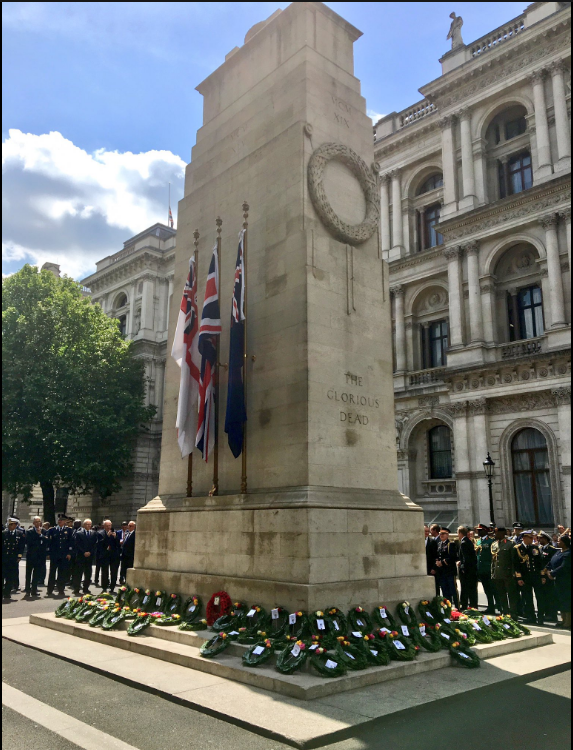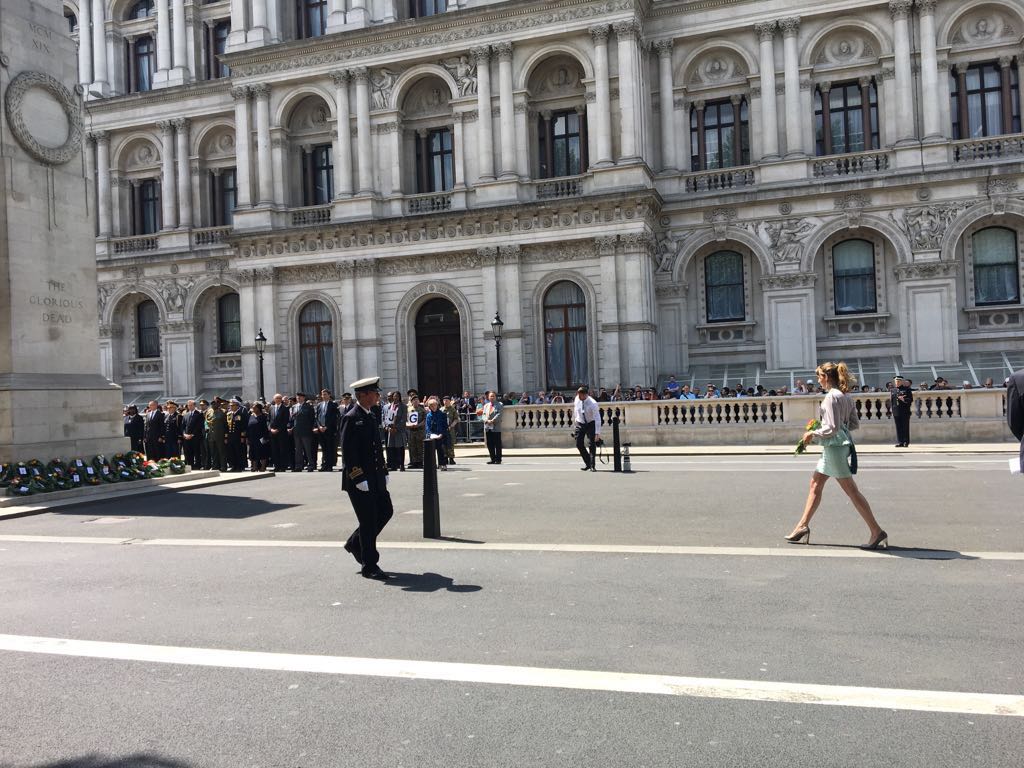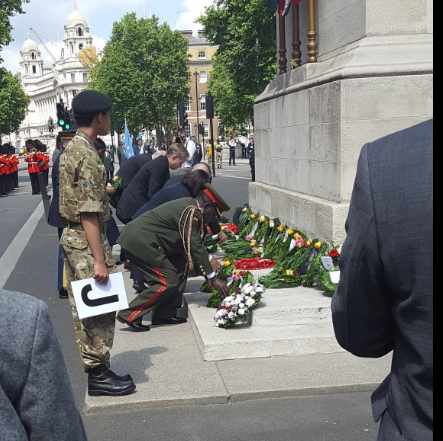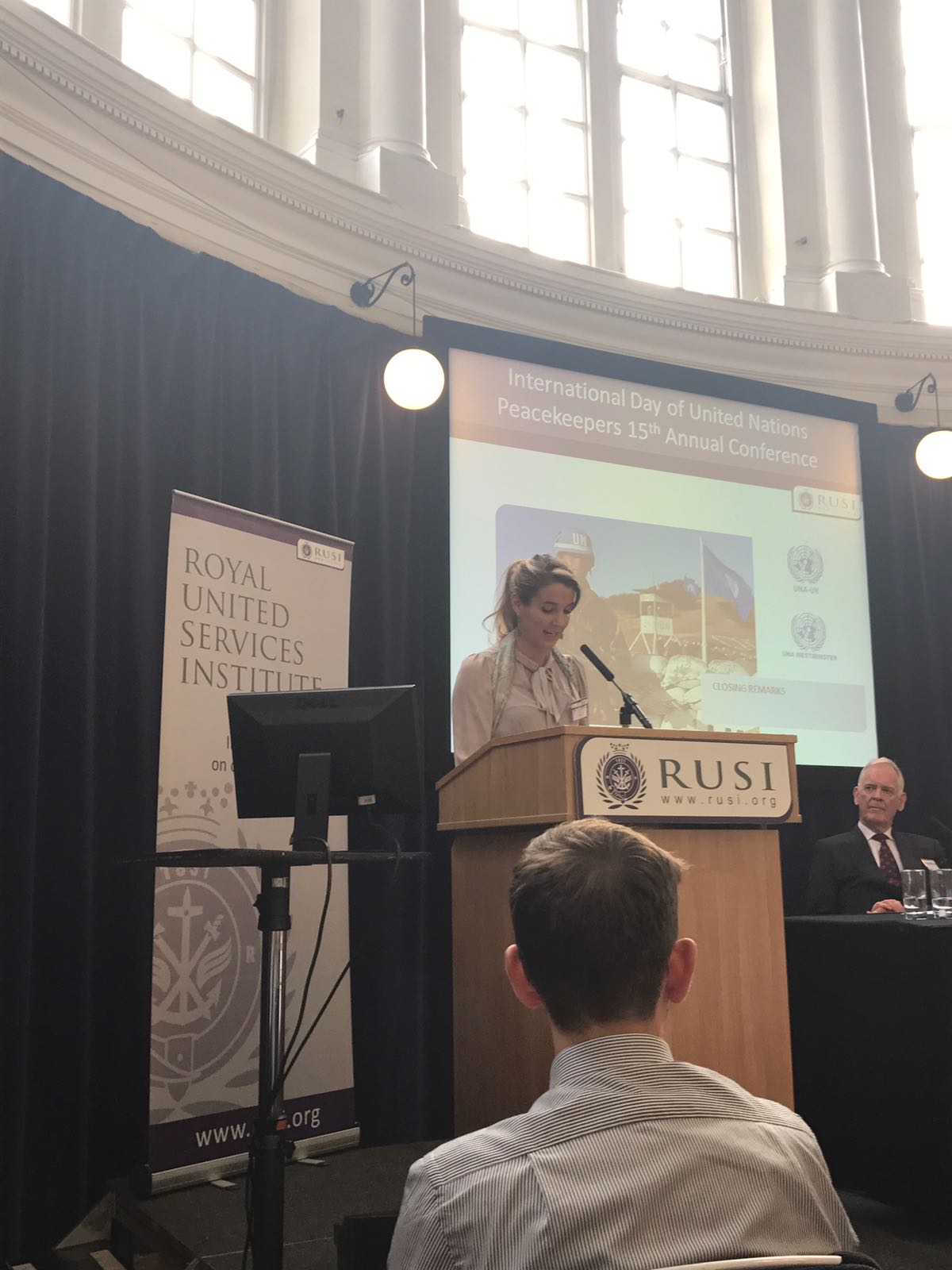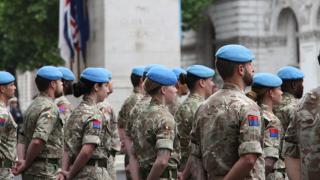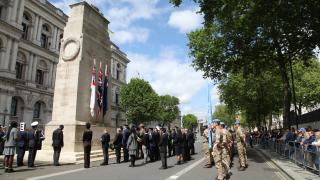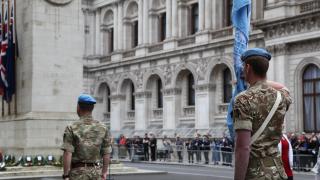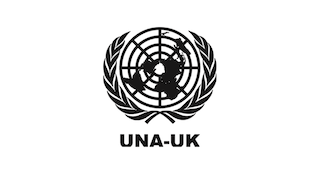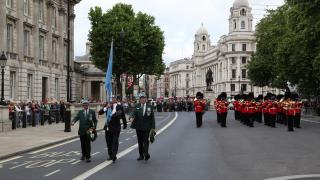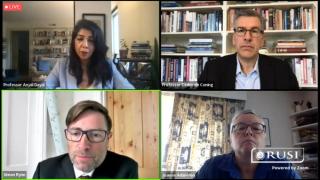Monday is the International Day of United Nations Peacekeepers. To mark the event, a memorial ceremony and conference were held by UNA-UK in partnership with UNA-Westminster and the Royal United Services Institute (RUSI). The event is the biggest such occasion in Europe and this year attendance hit an all-time high.
The ceremony took place at 1315 on May 24 and was the first event to be held on Whitehall following the terrorist attack in Manchester.
The band of the Welsh Guards, veterans of the UN Veteran Association, 14 VIPs (including Tessy Antony, Princess of Luxembourg, Alok Sharma, Parliamentary Under-Secretary of State, Foreign & Commonwealth Office, and General Sir Chris Deverell, Commander of Joint Forces Command) and the ambassadors, defence attaches and representatives of 115 different Embassies and High Commissions marched from the RUSI building to the Cenotaph where they laid wreaths to remember peacekeepers who have fallen in duty. Over 3,500 peacekeepers, 104 of them British, have given their lives in the service of peace while deployed with the United Nations. Photographs and a full list of participants are provided below.
Natalie Samarasinghe, Executive Director of UNA-UK, said,
“Peacekeepers risk their lives in some of the most dangerous places on earth in order to protect people and help countries create the conditions for lasting peace. These brave women and men give a lot to make our world safer, and over the years over 3,500 have given everything. It is right that we pay our respects, and we are delighted that such a significant section of our diplomatic community chose to do so”.
The memorial ceremony was part of a day-long conference on making peacekeeping work better, attended by over 180 experts and practitioners.
Ewan Lawson, Senior Research Fellow, RUSI, opened the conference with a moment of reflection for the victims of the Manchester attack. He introduced General Sir Gordon Messenger, Vice Chief of the Defence Staff, Ministry of Defence, who emphasised the importance of gender representation in peacekeeping and outlined the British Government’s “3P” agenda for improving peacekeeping: better planning, meaningful pledges, and increased performance.
The first session was entitled “‘Better Peacekeeping’ or ‘People Centred Peacekeeping’? What do these approaches mean and how can they be implemented?” Chaired by Dr Karin von Hippel, Director-General of RUSI, it featured Hilde F. Johnson, former Special Representative of the Secretary-General and Head of UNMISS (South Sudan) and Dr David Curran, Research Fellow, Coventry University.
Hilde Johnson succinctly captured the basic concept of ‘people centred’ peacekeeping as being "don't abuse people, work to protect people, and engage with people and listen to them”. She stressed the importance of engagement, and said that more work was needed to improve the UN Security Council resolutions that mandate peacekeeping missions, including to ensure that they recognise that the host state can be a hostile actor.
David Curran discussed the performance element of the 3P agenda, in particular questions of training and doctrine. He pointed out that the Security Council had mandated missions to ‘robustly’ use force, and had tasked missions with promoting ‘stability’ but had not adequately defined what either term meant, or how they could be squared with the traditional ‘three principles’ of peacekeeping: impartiality, non use of force, and host nation consent – all of which were coming under increasing pressure. This necessitated revisiting the fundamental doctrines of peacekeeping, something that hasn’t been done since the writing of the ‘Capstone’ doctrine in 2008.
The second session was the Folke Bernadotte Memorial Lecture. Natalie Samarasinghe, Executive Director, UNA-UK chaired the session and reminded the audience that the lecture was in memory of Count Folke Bernadotte, the UN’s mediator in Palestine, who was assassinated in Jerusalem in 1948, becoming the first member of United Nations Staff to be killed in the line of duty.
She then introduced the keynote speaker: Major General (Retd) Patrick Cammaert, the former General Officer Commanding of the Eastern Division of the UN Organization Mission in the Democratic Republic of the Congo (MONUC) and a former UN Force Commander and investigator. Major General Cammaert concentrated on the need for stronger leadership and exceptional field commanders, saying leaders must have the willingness and ability to hold individuals and units to account for their actions, and the new Secretary-General must show personal leadership. He also emphasised the importance of the UN Secretariat having the right tools and mechanisms to effectively monitor performance. He emphasised that Security Council mandates were only as strong as the willingness of commanders to implement them. He also stressed the importance of the wider political processes within which peacekeeping must sit, and the need to have more women in leadership positions within peacekeeping.
A video of Major General Cammaert’s speech will be made available on the RUSI website shortly.
After lunch, the inaugural Margaret Anstee Memorial Seminar was held. It started with reflections on the life of Dame Margaret, the first woman to lead a peacekeeping mission and the first woman to reach the rank of UN Under Secretary-General. Antonio Luvualu de Carvalho, Ambassador at Large for the President of the Republic of Angola, and HE Miguel Neto, Ambassador of Angola to the United Kingdom, spoke about Dame Margaret Anstee’s importance to Angola’s peace process and presented her cousin Peter Anstee with a plaque depicting her last meeting with the Angolan President. Peter offered some spontaneous remarks about the Anstee family.
Prof Christine Chinkin, Emerita Professor of International Law and Director of the Centre on Women, Peace and Security, LSE, spoke about Dame Margaret Anstee’s importance to the Women, Peace and Security agenda. Fred Carver, Head of Policy at UNA-UK, noted that she had been a longstanding member and adviser to UNA-UK and a personal friend of many UNA staff.
The session then considered the topic: “Leadership and accountability: how to improve trust and credibility in a context of ongoing allegations of sexual exploitation and abuse and a perceived failure to protect”. It was chaired by Professor Chinkin, with Nicola Dahrendorf, former Director and Senior Advisor on Sexual Abuse (SEA) & Chief of the MINUSCA Conduct and Discipline Team, Central African Republic; Dr Marsha Henry, Associate Professor, LSE, and Fred Carver as panellists.
Nicola Dahrendorf spoke about the importance of sexual exploitation and abuse being recognised as part of a wider problem, within the broader context of violence, and the broader Women, Peace and Security agenda. As an anthropologist, she felt that the deeper issues of power, gender, race, and the legacy of colonialism from which sexual exploitation and abuse often stem were largely unaddressed. She thought the response of the UN had been honest, but that member states showed varying levels of commitment to it. She made an appeal for the humanitarian doctrine of “do no harm” to be applied to peacekeeping.
Marsha Henry summarised her recent research on peacekeepers’ behaviour. This demonstrated that peacekeepers were a far from homogenous group but that in many instances anxiety drove the desire to be a peacekeeper - as peacekeeping offered stability and financial security. Some peacekeepers were therefore concerned that allegations of sexual abuse could threaten their job security. At the same time there was a sense of troops seeing what they could get away with. At the leadership level, this frequently resulted in an approach which attempted to cut down on incidents by preventing any kind of contact between peacekeepers and the local community, which was to the detriment of people-centred peacekeeping. Dr Henry further suggested that addressing sexual exploitation and abuse required far more attention to be paid to the practical needs of survivors. The attitudes of troop contributing countries to sexual abuse at the domestic and national level, and not just the behaviour of their peacekeepers or armed forces, should also be scrutinised.
Fred Carver outlined UNA-UK’s Mission:Justice campaign and the unveiled results of his recent poll and his plan for tackling abuse. He spoke about how reform attempts to date have concentrated, with varying degrees of success, on addressing issues of culture, training, coordination and process, but that there has been a limited focus on judicial processes. He felt that such reforms were entirely necessary, but would not be sufficient unless complemented by serious attempts to ensure prosecution of criminal acts of abuse.
The conference was then brought to a close by David Wardrop of UNA-Westminster and Tessy Antony, Princess of Luxembourg and a former peacekeeper herself, who thanked all the participants and our generous sponsors: the High Commission of Canada and the Consulate-General of the Republic of Angola. She summarised the day’s proceedings with some pertinent observations on the events in Juba last year, and the lessons that could be drawn in terms of coordination and leadership. A copy of her remarks is available here.
Photos can be reused and should be credited to UNA-UK unless taken from twitter in which case they should be credited to the twitter username embedded in the filename
Wreath laying ceremony
The following wreaths were laid:
- In memory of Count Folke Bernadotte - Count Edward Bernadotte
- On behalf of former UN servicemen and women - Kieran Ryan, Chair, UN Veterans Association
- In Memory of Commandant René de Labarrière - HE Mrs Sylvie Bermann, Embassy of France
- On behalf of Her Majesty’s Government - Alok Sharma, Parliamentary Under-Secretary of State, Foreign & Commonwealth Office
- On behalf of Her Majesty’s Armed Forces - General Sir Christopher Deverell, Commander of Joint Forces Command of the United Kingdom
- On behalf of Her Majesty’s Police Forces - Sir Thomas Winsor, HM Chief Inspector of Constabulary
Then on behalf of 115 Embassies and High Commissions, representatives from:
Afghanistan, Albania, Algeria, Angola, Argentina, Armenia, Australia, Austria, Bahamas, Bahrain, Bangladesh, Barbados, Belgium, Bolivia, Bosnia & Herzegovina, Botswana, Burundi, Cameroon, Canada, Chile, China, Colombia, Croatia, Cyprus, Czech Republic, Democratic Republic of Congo, Dominica, Dominican Republic, Ecuador, Egypt, Estonia, Ethiopia, Fiji, Finland, France, Georgia, Germany, Ghana, Greece, Grenada, Guinea, Guyana, Haiti, Honduras, Hungary, India, Indonesia, Iraq, Ireland, Italy, Jamaica, Japan, Jordan, Kenya, Republic of Korea, Kosovo, Kuwait, Kyrgyzstan, Laos, Lebanon, Liberia, Libya, Luxembourg, Macedonia, Malawi, Malaysia, Malta, Mauritius, Mexico, Moldova, Mongolia, Montenegro, Morocco, Mozambique, Myanmar, Nepal, Netherlands, New Zealand, Nigeria, Norway, Oman, Pakistan, Paraguay, Peru, Philippines, Poland, Portugal, Qatar, Romania, Russian Federation, Rwanda, Serbia, Seychelles, Slovakia, Slovenia, South Africa, South Sudan, Spain, Sri Lanka, Sudan, Swaziland, Sweden, Switzerland, Tanzania, Thailand, Togo, Tonga, Trinidad & Tobago, Uganda, Ukraine, United Arab Emirates, USA, Venezuela, Yemen and Zambia
Then:
- On behalf of the widows of UN peacekeepers - Baroness Garden of Frognal
- On behalf of former UN civilian staff - David Irwin
- On behalf of the United Nations Association - Tessy Antony, Princess of Luxembourg
- On behalf of the British Association of Retired UN Civil Servants - David Mitchels
- On behalf of the Royal United Services Institute - Dr Karin von Hippel
- In memory of Dame Margaret Anstee - Students from the Chelmsford County High School for Girls and the Anglo-European School
- On behalf of the Youth of the World - Students from the Grey Coat Hospital School for Girls and the Westminster City School for Boys

